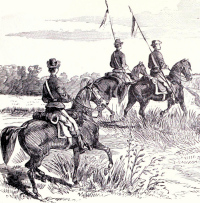Warsaw, October 17th. Yesterday we made our longest march, making twenty-five miles, and encamped three miles north of this place.
It is a problem, why riding in a column should be so much more wearisome than riding alone, but so it undeniably is. Men who would think little of a sixty-mile ride were quite broken down by to-day’s march.
As soon as we reached camp, the General asked for volunteers from the staff to ride over to Warsaw: of course the whole staff volunteered. On the way we met General Sigel. This very able and enterprising officer is a pleasant, scholarly-looking gentleman, his studious air being increased by the spectacles he always wears. His figure is light, active, and graceful, and he is an excellent horseman. The country has few better heads than his. Always on the alert, he is full of resources, and no difficulties daunt him. Hunter, Pope, and McKinstry are behind, waiting for tea and coffee, beans and flour, and army-wagons. Sigel gathered the ox-team and the farmers’ wagons and brought his division forward with no food for his men but fresh beef. His advance-guard is already across the Osage, and in a day or two his whole division will be over.
Guided by General Sigel, we rode down to the ford across the Osage. The river here is broad and rapid, and its banks are immense bare cliffs rising one hundred feet perpendicularly from the water’s edge. The ford is crooked, uncertain, and never practicable except for horsemen. The ferry is an old flat-boat drawn across by a rope, and the ascent up the farther bank is steep and rocky. It will not answer to leave in our rear this river, liable to be changed by a night’s rain into a fierce torrent, with no other means of crossing it than the rickety ferry. A bridge must at once be built, strong and firm, a safe road for the army in case of disaster. So decides the General. And as we look upon the swift-running river and its rocky shores, cold and gloomy in the twilight, every one agrees that the General is right. His decision has since been strongly supported, for to-day two soldiers of the Fremont Hussars were drowned in trying to cross the ford, and the water is now rising rapidly.
This morning we moved into Warsaw, and for the first time the staff is billeted in the Secession houses of the town; but the General clings to his tent. Our mess is quartered in the house of the county judge, who says his sympathies are with the South. But the poor man is so frightened, that we pity and protect him.
Bridge-building is now the sole purpose of the army. There is no saw-mill here, nor any lumber. The forest must be cut down and fashioned into a bridge, as well as the tools and the skill at command will permit. Details are already told off from the sharp-shooters, the cadets, and even the body-guard, and the banks of the river now resound with the quick blows of their axes.
Fremont’s Hundred Days in Missouri was published in three installments in The Atlantic Monthly. The anonymous author appears to have been a member of Fremont’s staff with a disdainful bias towards Missourians, even those who were pro-Union.
